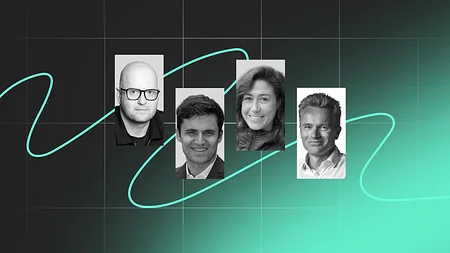The rise of the NeoTrust: making dying less expensive

Delivered straight to your inbox
Get each edition of Unfiltered - our no-BS, uncensored analysis of fintech news and hot topics sent to your inbox each fortnight.
Find out more
Death. It's inevitable. It's also a financial nightmare most don't see coming. But what if you could save tens, if not hundreds of thousands of dollars during this grim process?
Besides the obvious funeral costs (which can cost anything from $7,000-$12,000), settling someone's estate is riled with fees that whittle away the wealth that should be transferred to your loved ones. The common saying is that there are only two certainties in life; death and taxes. Turns out they also come in pairs.
Settling an estate is a marathon, not a sprint.
Fees, fees, and more fees
Upon death, an estate must first pass through probate - a court process originating from the Middle Ages where ecclesiastical courts would validate the legitimacy of the will and appoint the "Executor" responsible for transferring wealth. In present times, most jurisdictions require a substantial court tax or a 5% executor statutory fee for this, let’s take California as an example:
4% on the first $100,000,
3% on the next $100,000,
2% on the next $800,000,
1% on the next $9M, and so forth.
For an estate worth $1M, this equates to $46,000. Take Ontario, Canada as another example, where court fees amount to 1.5% of the value above $50,000, that same estate would incur probate fees of $14,250, if no lawyer gets involved and your executor waives their right to compensation. Otherwise, you may expect additional fees approaching $50,000. And that's just the beginning.
Settling an estate is a marathon, not a sprint. It typically takes 12 months or longer, involving paperwork, collaboration with financial institutions, account management, and navigating complex family dynamics. Most lay individuals who have tried tackling this alone regretted the decision.
ClearEstate’s own survey shows that North American executors rank this ordeal as one of life's most challenging experiences — right up there with divorce. Traditional support methods involve working with a myriad of lawyers, advisors, and accountants paid by the hour or engaging a Trust office—if one qualifies. Trust services require a minimum wealth level and charge fees like:
4.5% on the first $1M,
3.5% on the next $1M,
2.5% on the next $3M,
2% on the next $5M, and so forth.
Sound familiar? That's another ~$45,000 deducted from your estate.
Over the next 25 years, $65 trillion will exchange hands in North America alone.
Why are we still waiting on NeoTrusts?
We’ve all seen neobanks like Starling, Monzo, and Chime gain attention for challenging high banking fees, democratising access to underserved segments of the market, and addressing poor client experiences. According to the Financial Brand's Neobank Tracker, over 350 challengers worldwide are attempting to disrupt the banking incumbents.
So why is it that when it comes to the same disruption in the trust space, ClearEstate is the only one?
It’s even more surprising when you consider the demographic shift accelerating the need for more services geared toward an aging population and the impending massive intergenerational wealth transfer - over the next 25 years, $65 trillion will exchange hands in North America alone—three times China's GDP passed from one generation to the next.
Traditional Trusts cater to the ultra-wealthy, often transporting wills in private jets or operating as underinvested, paper-based lines of business within banks—frequently used as loss leaders to retain assets from their private wealth enterprises. As a result of these archaic practices, their platforms and experiences have been neglected, leaving tech largely the same as it was decades ago.
The modern-era trust is built around solving these challenges for consumers, assisting families with their estate planning and settlement needs through democratised access to all levels of wealth at fair and accessible prices. It flips the traditional trust model outside-in, focusing on making trust and estate services the core offering, not just a loss-leader retention tool for private banking.
The modern-era trust starts with the consumer pain point in mind, helping solve both the administrative and emotional elements of working through an estate. At ClearEstate, we’ve found the winning recipe to be in merging the power of technology with human expertise and empathy to guide grieving consumers. Technology now allows us to automate tedious tasks such as identifying and filling out probate forms, generating testamentary documents, estimating financial implications, bookkeeping estate gains/expenses, and filing for taxes, helping scale a practice that was once all paper-based and manual.
Estates being highly complex and emotional, we’ve found that facilitating communication between stakeholders in a transparent way and providing human reassurance in challenging times is the key to avoiding difficult family tensions and even litigation. What if, instead of being kept in the dark on where the process stands, what inheritance you’re entitled to, and asking for constant updates from their executor, family members could simply log in to a platform to view all the relevant information?
My Unfiltered opinion
Isn't it time that we all had access to the services helping us navigate one of life's most challenging times? So much has been done to improve access and experience in traditional banking, shouldn’t we do the same for Wealth Management and Trust services?
Pioneering a business at the nexus of Legaltech, WealthTech, and Agetech, riddled with jurisdictional differences and legacy regulatory frameworks built for a paper world isn’t for the faint of heart, but for those who do, the benefits of creating a platform in the greatest money transfer the world has seen will be worth it - both for their shareholders and customers.
This is the dawn of the NeoTrust era, democratising access to the masses because ultimately, everyone will need it when the final curtain falls.




